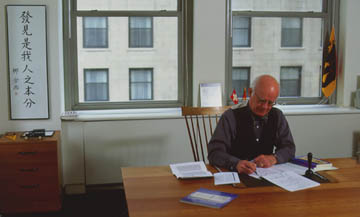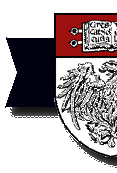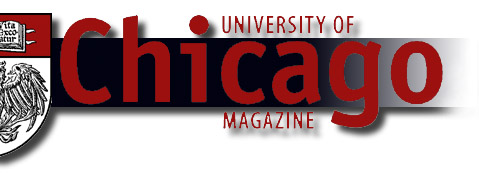 |

Today Marty
sits on a dozen boards and has been given five dozen honorary degrees
as well as the National Humanities Medal and the Medal of the American
Academy of Arts and Sciences. He is the George B. Caldwell senior
scholar-in-residence at the Park Ridge Center for the Study of Health,
Faith, and Ethics, and he directs the Public Religion Project at
the U of C, where in March he gained emeritus status as the Fairfax
M. Cone distinguished service professor.
Despite his
stature, despite the remarkable visibility, when you ask the man
with the name how he'd like to be remembered, he says, "That I was
a good teacher. That's been my great joy, where I've always gotten
the most pleasure."
Entering Marty's
fifth-floor office at the Public Religion Project, across from the
Drake Hotel where Walton Street crosses Michigan Avenue, you spy
him before he sees you. He is seated at a table-framed within two
doorways, down a short hallway-reading, eating a bagel. In a sort
of telescopic fashion there he is: the man with the name. It is
a spacious corner office-glass all around, offering a lookout's
view of the rustling city streets, the honking cabs, and hurried
people. There are books and neatly arranged papers and framed, retro
posters of the old South Shore Line and a photo of Marty's father,
a Lutheran schoolteacher and organist.
You are dutifully
punctual, even fearfully early, because of Marty's reputation regarding
time. As in "Marty time"-reflecting, perhaps, the precision, organization,
and frugality genetically administered by his Swiss ancestry. Again,
the tales are legend. Days calibrated to the minute. His ability
to thrive on four, maybe five, hours of sleep. His 7-, 8- and 10-minute
naps scheduled throughout the day to refresh him-meticulously timed,
sometimes in full recline on his office floor, always a quick but
deep, reviving sleep. His knack for comfortably doing two, three
tasks at once.
This last habit
is especially unnerving to graduate students who diligently prepare
presentations then sweat through them-laboring insecurely-while
overseer Marty, last row of the classroom, appears distracted, preoccupied,
busily attending other tasks. He is reading, writing, checking his
mail, making notations in his checkbook, until the discourse is
complete. At which time he surgically dissects and masterfully elucidates
(in stunning detail) the presentation's strengths, weaknesses, finer
points, miscalculations.
You don't
want to be late.
But what you
find is that Marty greets you hospitably, warmly. When asked about
his achievements, he does not offer you a list of publications or
his curriculum vitae, his profile in Who's Who in the World, or
even the testimonials of those who nominated him (the list of nominators
itself a who's who) for the University of Chicago Alumni Medal,
which he proudly received at Reunion this year. Instead, he produces
a very, very long list of graduates on whose dissertations he is
listed as first adviser.
"I take more
pleasure," the professor explains, "in the fact that there are more
than 100 people I was thesis adviser to, more pleasure in a new
book by Scott Appleby or someone of his vintage, than one of my
own." R. Scott Appleby, AM'79, PhD'85, now director of the Cushwa
Center for the Study of American Catholicism at the University of
Notre Dame, was a research assistant under Marty and later worked
down the hall from him for more than five years while the two coedited
a landmark, six-volume study of religious fundamentalism around
the world.
"The grueling
schedule, the Marty pace, and the Marty quality," says Appleby,
"is not human." Yet what the protégé emphasizes is this: the Marty
parties, the ones for students at his 100-year-old home in the Chicago
suburb of Riverside, those Christmas and springtime festivities
with charades and door prizes; the hundreds, probably thousands
of letters of recommendations; the hundreds of scholars Marty has
guided as "unofficial mentor"; the countless number of people personally
helped. What Appleby emphasizes is that Marty "gives and gives and
gives to his students, far outspending them in generosity," that
he "is always thinking of other people, that everything is done
graciously, with a smile on his face, that service is very central
to what he does."
"Marty is not
God," Appleby told the 1996 gathering of the Society for the Scientific
Study of Religion, which gave the religious historian its career
achievement award that year. "But he is a condition of the possibility
for one. The workings of grace in him are powerfully transparent."
Indeed. This
past February more than 500 people helped Marty celebrate his 70th
birthday at a party co-hosted by his wife Harriet, Norman Lear,
and journalist Bill Moyers-who set aside some good-natured teasing
to say, "Martin Marty's God is a big-hearted God, and Martin Marty's
America does not shrink from, nor fear, the New World tribalism
that he himself saw coming 25 years ago. Perhaps his greatest contribution
is to remind us, over and over again, of the importance of telling
our stories of belief and practice, of hope and defeat, of loss
and the promise of redemption."
Given Marty's
accomplishments, given the intensity and fervor and dedication brought
to his life's work, to his teaching and writing, to his students
and colleagues and comrades in thought, the tireless productivity,
the drive and the will and the many applications of his knowledge
and gifts and wisdom, you expect to find a man less congenial, less
at peace, less serenely comfortable sitting back for an afternoon's
conversation. You also suspect that something has been neglected
or sacrificed in the pursuit of those many demands. Or that the
man's life has been charmed, tragedy free. Not so. On the contrary.
Marty married
Elsa Schumacher in 1952, the same year he was graduated from the
seminary and ordained. Despite the many demands imposed on the ambitious
scholar-teacher and despite the many callings from distant venues,
the young husband and father guarded and cherished his family time.
Saturdays especially were sacred days in the Marty household-an
extended family of six children, including two who joined the Martys
as foster children. This was in the mid-'60s when Marty, ministering
to migratory workers, grew close to and took in a 3-year-old boy
and 12-year-old girl. But there were others who came and stayed
and eventually moved on-two boys from Uganda, for example, and seven
or so adolescents who moved in, off-and-on, for various lengths
of time. "In the summertime," Marty recalls, "there'd be these sort
of inner-city strays living with us, kind of a UN under our roof."
Not only were
Saturdays devotedly reserved for family time, but the annual camping
trips became noteworthy expeditions, taking the Marty clan to 47
states, Canada, Mexico, and 13 European nations. Then there was
the 11-year period when the family retreated each summer to an island
harbor in Lake Michigan. But in the midst of these happily tumbling
years, Elsa was diagnosed with brain cancer, struggled for 10 months,
and died in September 1981.
At the urging
of a publisher Marty wrote A Cry of Absence: Reflections for
the Winter of the Heart, a personal meditation on those heartache
months of nursing Elsa. Now a classic in spirituality, the reflective
memoir and the response it generated has moved the scholar to write
other books dealing more personally with the Christian journey through
the contemporary landscape (including three collaborations with
his son Micah, a photographer).
In the midst
of this healing, Marty reconnected with a longtime friend, the widow
of his college roommate. He and Harriet, a mother of one, and a
musician and teacher who has better acquainted Marty with music,
the arts, and entertainment, were married in 1982-concrete evidence,
Marty has said, of the dramatic workings of providence in his life.
Harriet, it
seems, is the source of something you have heard about Marty, something
curious; because it is clear Marty is onto something-something that
makes him who he is, unique and special in the universe of scholars,
thinkers, theologians, writers. Appleby says it is because Marty
feels forgiven. Forgiven. You ask Marty if that is true, and what
he has been forgiven for. You ask about guilt and forgiveness.
He smiles and
tells a story about how one night Harriet had been troubled by some
things and how Marty suggested she not "take on the burden of all
this," to which she replied, "It would be helpful if you had a little
sense of guilt." Marty smiles again at the memory, then offers an
illuminating discourse on guilt and forgiveness, issues central
to Christian faith and redemption. He talks about the importance
of forgiving others-"a conscious willed act that comes in the form
of a gift, that becomes a way of life," he says, adding, "If you
see a person who does that habitually, you see a free person. If
I forgive you, it liberates me."
It is odd
that the subject has come up today, Marty says, because the Los
Angeles Times has just asked him to write a piece on forgiveness
and Bill Clinton, and he has recently contributed an essay to a
book dealing with forgiveness and the Holocaust. So he cites Paul
Tillich and he talks about Martin Luther's "core gospel of forgiveness"
and his attempts "to find a gracious God."
Then Marty
explains, "I make a great deal out of the words 'ordinary,' 'quotidian,'
'daily.' I believe very much in the sense of each day. There is
a Lutheran precept that we are born again every day, that we have
a new slate; and if you have made every effort at reparation and
reconciliation, and maybe talk to God a little, and if you then
wake up feeling guilty, it is your own fault. There is really no
reason to worry because each day takes care of itself."
You have heard
of people living in each moment and you have been told Marty is
one of these, that he has the ability to focus clearly and cleanly
on each task at hand, each student's problem, each puzzle begging
analysis, each demand on his time. Then he proceeds to the next.
He likes, he says, the word (if there is indeed such a word) "intrinsicality."
What he means, he explains, "is the integrity of each day, the intrinsic
worth of each act in each day, the intrinsic worth of the act you
are doing."
That, he says,
is the unifying principle at the center of his life. And as you
pursue that center, he tells you:
- that his
"model" has been Pope John XXIII, whom Hugo Rahner described as
"God's grave and merry person," an appellation Marty says he'd
gladly take as his own;
- that in
his role as a "public scholar" and "civic pedagogue" he has tried
to be "a fanatically faithful scholar";
- that his
"life quest" has been understanding and explaining the public
and religious pluralism and "what each takes from the other";
- that in
a life devoted to intellectual pursuits it is better "to be moored
rather than unmoored, to know where the port is"-his own "port"
being his "sense of roots," his "Nebraska Lutheran childhood"
to which he returns after venturing into "the cosmopolitan world
of academia, secularity, pluralism, and sophistication";
- and that
he is "not afraid of the home stretch."
This last derives
from a discussion of his "retirement" and whether or not he will
really be slowing down. "The ideal," Marty says, "would be to do
so; if virtuous, I would slow down." There are friends, he points
out, he'd like to spend "two hours with instead of 10 minutes,"
and he'd like "more balance between leisure and activity," recognizing
that "productivity and recreation are both virtues," and that there's
"a whole library of books on the shelf at home and I'd like to sit
on the porch and read through it."
But then there
was his spring project-a Divinity School conference on Narratives
in American Religion ("I love narrative. My theology is narrative,
is storied.") More books that "talk to the soul" to write. And more.
Yet more. Marty borrows a metaphor from an old friend who died at
age 102. "Life is a book of chapters," he says. "And I see my life
as a library book, one checked out long ago. The spine is now cracked,
the pages frayed. The book is well-read, perhaps long overdue, and
soon the library will call me in.
"But," he goes
on, "there's a new chapter, a new plot developing, new dramas, a
new set of assignments. I don't think anything is anticlimactic.
Each chapter surprises me. I look forward to the surprises in each
chapter."
The conversation
turns a bit, with Marty explaining how nervous he gets before preaching,
with him predicting trends in religion in the decades ahead, with
him talking about how he probably always knew he would teach and
write, about time management and his childhood and the day he and
a boyhood friend dropped in on Carl Sandburg. They were scolded
by Sandburg's wife and told the writer was busy upstairs, that they
should get along now. But soon the author himself came down and
scolded the boys and told them they were interrupting and intruding-before
inviting them up to his study for a gracious afternoon's talk.
This last is
an example, Marty says, of disponibilité, being flexible with one's
time, making oneself available to others. One of Marty's great gifts,
says Appleby, is captured in Eugen Rosenstock-Huessy's Respondeo
etsi Mutabor: "I respond even though I have to be changed."
In many ways,
you figure, Marty's life has been one of adapting, adjusting, responding,
being changed by the many ways he serves others, yet changing others
by the way he responds to them, to their questions, needs, requests,
petitions. Answering calls, God's calling.
Thinking of
the final call, you have to ask him, "Are you afraid of dying?"
To which Marty
responds smiling, deferring to Woody Allen: "I'm not afraid of dying.
I just don't want to be there when it happens." You both laugh;
Marty continues, "I could live with annihilation, extinction. We
will die, accidents happen, people will forget we ever lived. But
I am a terrible chicken about pain. And I do not, of course, look
forward to the painful decline of my powers. I saw my wife go through
brain cancer, and it's not a pretty sight."
Marty then
talks about the immortal soul, the difference between Greek and
Christian conceptions, the incomprehensibility of eternal life,
and how every morning he awakens at 4:57 a.m., three minutes before
the alarm is set to go off, and abides by "the Lutheran custom of
making the sign of the cross and saying a little prayer-a daily
reminder that you are mortal, that the body is mortal."
Of course,
it is clear to you-from the many people touched, the many words
written, the Divinity School's new Martin Marty Center to study
religion's role in public life and culture-that Marty's life is
richly layered, that his house has many rooms. And you know he has
found answers to questions still nagging you, that there is so much
more to learn from him. But you sense it is time for you to go,
time for him to get on with his life, to give his full attention
to the next task at hand. And as you walk away, looking back at
the professor returning to his office, you see and are glad that
the man with the name is inspiritingly human.
|



